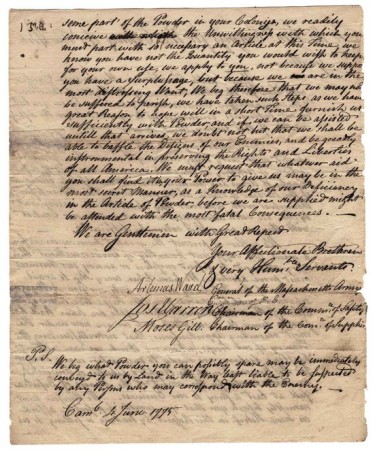“Cambridge, June 4, 1775.
May it please your Honours: We beg leave to represent to you the peculiar distresses of this Colony, being assured that you will, as the wise guardians of the lives, liberties, and properties of the whole of this extensive Continent, attend to the several circumstances of all who, under God, look up to you for protection and deliverance.
Our capital is filled with disciplined troops, thoroughly equipped with every thing necessary to render them formidable. A train of artillery, as complete as can be conceived of; a full supply of arms and ammunition; and an absolute command of the harbour of Boston, which puts it in their power to furnish themselves with whatever they shall think convenient by sea, are such advantages as must render our contest with them in every view extremely difficult.
We suffer at present the greatest inconveniences from a want of a sufficient quantity of [gun]powder; without this every attempt to defend ourselves or annoy our enemies, must prove abortive. We have taken every step to avail ourselves of this article, by drawing into our general magazines whatever could be spared from the respective Towns of this Colony; but the frequent skirmishes we have had have greatly diminished our stock, and we are now under the most alarming apprehensions that, notwithstanding the bravery of our troops, (whom we think we can, without boasting, declare are ready to encounter every danger for the preservation of the rights and liberties of America,) we shall, barely for want of the means of defence, fall at last a prey to our enemies.
We, therefore, most earnestly beseech you, that you would warmly recommend it to the other Colonies, to send whatever ammunition they can possibly spare forthwith to our relief. The manner of recommending this matter we submit to your superior judgment; we only beg leave to suggest, that an immediately supply is of the last importance to use, and that a discovery of our weakness in this particular, before we receive assistance, may be fatal, not to us only, but to the liberties of the whole Continent; whereas, with a full supply of arms and ammunition, we might, with the common blessings of Providence, baffle the designs of our enemies, and be greatly instrumental in bringing our present disputes to a happy issue. We are your Honours’ most obedient servants,
Art. Ward, General of the Massachusetts Forces.
Jos. Warren, Chairman of the Comm. of Safety.
Moses Gill, Chairman of the Comm. of Supplies.
P.S. We beg what powder you can possibly spare may be immediately conveyed to us by land in the way least liable to be suspected by any persons who may correspond with the enemy.
Source: Peter Force, ed. General Ward and Others to Continental Congress, in: American Archives, Fourth Series, Vol. II, p. 906. The manuscript original is coming to auction on December 10, 2016 as lot #24 by Alexander Historical Auctions of Chesapeake, Virginia.
Commentary: Several weeks into the Siege of Boston, Patriot leaders keenly felt their lack of gunpowder. Two weeks prior Joseph Warren dispatched Dr. Benjamin Church to Philadelphia as a special emissary to implore the Second Continental Congress to establish an American army and to appoint its commanding general.
This letter calls special attention to the urgent need for gunpowder. Desired means of conveyance is also specified. The signatories want the gunpowder sent discretely by land to avoid advertising this weakness to Loyalists and to preclude seizure at sea by dominant British naval forces. It is co-signed by the combined civil and military leaders overseeing the siege at that juncture: Joseph Warren representing the Massachusetts Provincial Congress, Artemas Ward (1727-1800) on behalf of the mobilized militias, and Moses Gill (1734-1800) representing the de facto supply corps.
Considering this missive was sent via express to Philadelphia early in June, it would have been no surprise to George Washington, arriving in Cambridge to take command of the newly established Continental Army in early July 1775, that gunpowder was in critically short supply. The issue for him and the American forces was not whether this was a critical issue, but rather the extent of the deficit following the Battle of Bunker Hill. The issue was already considered dire by Artemas Ward, Joseph Warren , and Moses Gill prior to the June 17th battle.

 Follow
Follow